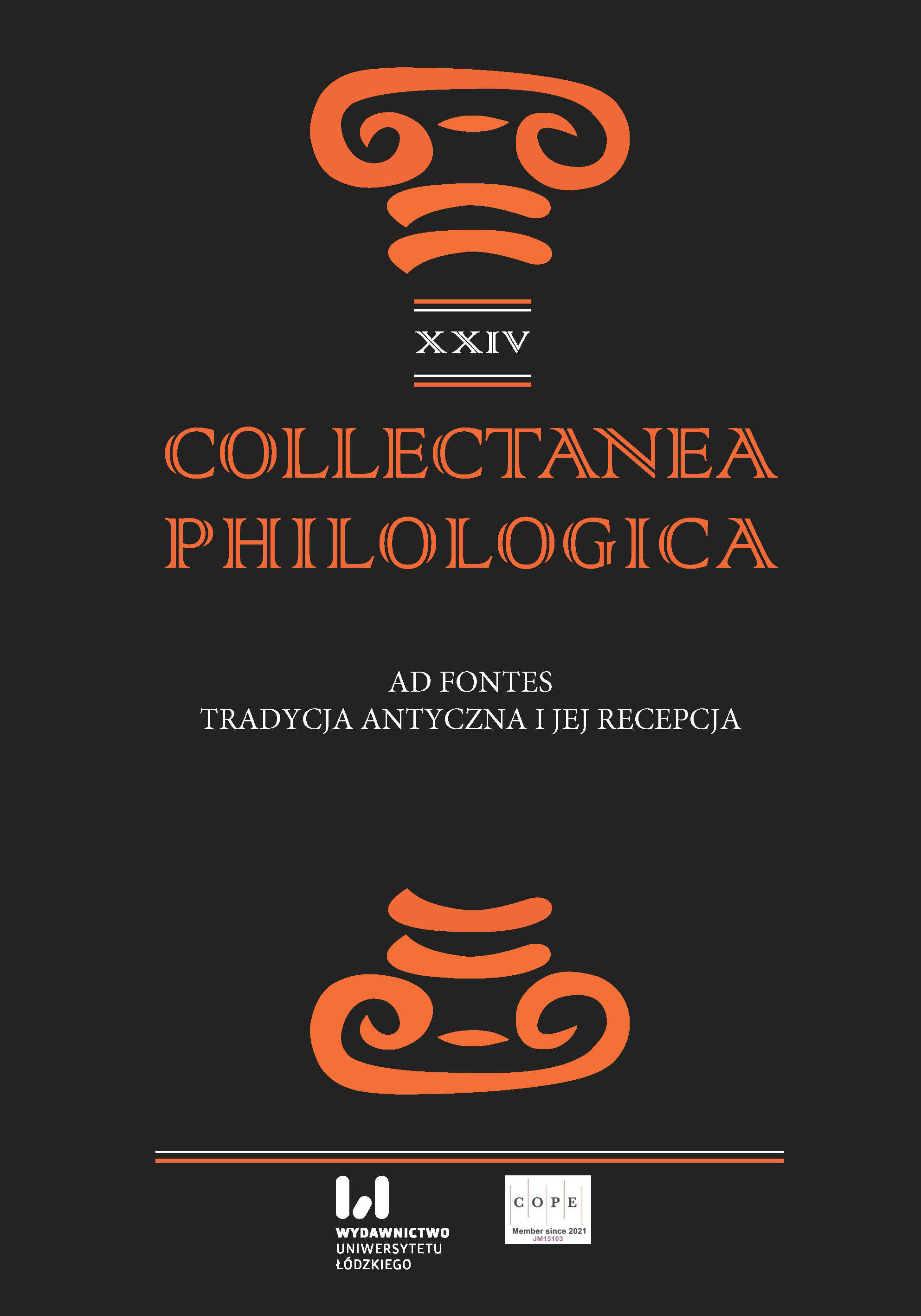Miłość i poezja w Elegii 2.30 Sekstusa Propercjusza
DOI:
https://doi.org/10.18778/1733-0319.24.04Słowa kluczowe:
Propercjusz, elegia rzymska, mitologiaAbstrakt
Elegy 2.30 has been considered to be one of Propertius’ most difficult poems due to its complicated sequence of thought and distant associations noticeable in the discourse, which was often the reason for dividing the text into two separate poems. The article is an interpretative proposal aimed at demonstrating the integrity of 2.30, which was obtained by the poet by combining the concept of love with the concept of love poetry, as well as by using subtly constructed mythological references.
Bibliografia
Butler-Barber (1933). The Elegies of Propertius. Edited with an introduction and commentary by H.E. Butler, E.A. Barber. Oxford: Clarendon Press.
Google Scholar
Camps, W.A. (1967). Propertius, Elegies, Book II. Edited by W.A. Camps. Cambridge: Cambridge University Press (repr. 1985).
Google Scholar
Enk, P.J. (1962). Sexti Properti Elegiarum liber secundus cum prolegomenis, notis criticis, commentario exegetico. Edidit P.J. Enk, vol. I–II. Leiden: In Aedibus A.W. Sijthoff.
Google Scholar
Fedeli, P. (1984). Sexti Properti elegiarum libri IV. Edidit Paolo Fedeli Stuttgart: Teubner.
Google Scholar
Fedeli, P. (1985). Properzio, Il Libro Terzo delle Elegie. Introduzione testo e commento di Paolo Fedeli. Bari: Adriatica Editrice.
Google Scholar
Helm, R. (1965). Properz, Gedichte, lateinisch und deutsch von R. Helm. Berlin: Akademie-Verlag.
Google Scholar
DOI: https://doi.org/10.1515/9783112572924
Richardson, L.N.Jr. (1977). Propertius, Elegies I–IV. Edited with introduction and commentary by L. Richardson, Jr. Norman: University of Oklahoma Press.
Google Scholar
Rothstein, M. (1898). Die Elegien des Sextus Propertius. Erklärt von Max Rothstein, 1. Teil: Erstes und zweites Buch. Berlin: Weidmannsche Buchhandlung (2Berlin 1920).
Google Scholar
Babnis, T. (2017). „Augustan poets on the Roman-Parthian treaty of 20 BC”. Classica Cracoviensia 20. 5–44 https://doi.org/10.12797/CC.20.2017.20.01
Google Scholar
DOI: https://doi.org/10.12797/CC.20.2017.20.01
Babnis, T. (2018). „Sive aliquid Augustus parcet Eois. Wschodnia polityka Rzymu w poezji Propercjusza”.
Google Scholar
Roczniki Humanistyczne 66, z. 3. 9–26 https://doi.org/10.18290/rh.2018.66.3-1
Google Scholar
DOI: https://doi.org/10.18290/rh.2018.66.3-1
Benediktson, D.Th. (1982). Studies in the Use of Mythology by the Roman Elegists. Diss. Austin: University of Texas.
Google Scholar
Benediktson, D.Th. (1986). Catullus 58B defended. Mnemosyne Fourth Series 39. 305–312 https://doi.org/10.1163/156852586X00455
Google Scholar
DOI: https://doi.org/10.1163/156852586X00455
Bobrowski, A. (1997). Mitologia w rzymskiej elegii i liryce miłosnej okresu augustowskiego. Kraków: Księgarnia Akademicka.
Google Scholar
Butrica, J.L. (1984). The Manuscript Tradition of Propertius. Toronto–Buffalo–London: University of Toronto Press.
Google Scholar
DOI: https://doi.org/10.3138/9781442632776
Cairns, F. (1971). „Propertius, 2.30 A and B”. The Classical Quarterly. 21. 204–213 https://doi.org/10.1017/S0009838800028950
Google Scholar
DOI: https://doi.org/10.1017/S0009838800028950
Cairns, F. (2006). Sextus Propertius. The Augustan elegist. Cambridge: Cambridge University Press.
Google Scholar
Camps, W.A. (1964) „Propertiana”. The Classical Review 14. 6–9 https://doi.org/10.1017/S0009840X00217903
Google Scholar
DOI: https://doi.org/10.1017/S0009840X00217903
Camps, W.A. (1979). „L. Richardson, Jr., Propertius, Elegies I–IV” [Review]. The Classical Review NS 29. 37–39 https://doi.org/10.1017/S0009840X00230254
Google Scholar
DOI: https://doi.org/10.1017/S0009840X00230254
Commager, S. (1974). A Prolegomenon to Propertius. Norman: University of Oklahoma Press.
Google Scholar
Kocur, M. (2005). We władzy teatru. Aktorzy i widzowie w antycznym Rzymie. Wrocław: Wydawnictwo Uniwersytetu Wrocławskiego.
Google Scholar
La Penna, A. (1977). L’integrazione difficile. Un profilo di Properzio. Torino: Giulio Einaudi editore.
Google Scholar
Landels, J.G. (2003). Muzyka starożytnej Grecji i Rzymu, przeł. M. Kaziński. Kraków: Homini (I wyd. ang.: Music in Ancient Greece and Rome. London 1999: Routledge).
Google Scholar
Lefèvre, E. (1966). Propertius ludibundus. Elemente des Humors in seinen Elegien. Heidelberg: Winter.
Google Scholar
Lieberg, G. (1969). Die Mythologie des Properz in der Forschung und Idealisierung Cynthias. Rheinisches Museum für Philologie 112. 311–347.
Google Scholar
Luck, G. (1962). Beiträge zum Text der Römischen Elegiker. Rheinisches Museum für Philologie 105. 337–351.
Google Scholar
Lyne, R.O.A.M. (1979). „Servitium Amoris”. The Classical Quarterly 29. 117–130 https://doi.org/10.1017/S0009838800035229
Google Scholar
DOI: https://doi.org/10.1017/S0009838800035229
MacKay, L.A. (1937). „Propertius II, 30 Quo fugis a demens”. The Classical Journal 33. 163–164.
Google Scholar
Maltby, R. (2006). Major Themes and Motifs in Propertius’ Love Poetry. W: Günther, H.-Ch. (red.). Brill’s Companion to Propertius. Leiden–Boston: Brill. 147–181.
Google Scholar
Murgia, Ch.E. (2000). The Division of Propertius 2. Materiali e discussioni per l’analisi dei testi classici 45. 147–242 https://doi.org/10.2307/40236186
Google Scholar
DOI: https://doi.org/10.2307/40236186
Nilsson, N.-O. (1947). „Zur Erklärung von Properz II 30”. Eranos 45. 37–58.
Google Scholar
Reinhard, T. (2006). Propertius and Rhetoric. W: Günther, H.-Ch. (red.). Brill’s Companion to Propertius. Leiden–Boston: Brill. 199–216 https://doi.org/10.1163/9789047404835_012
Google Scholar
DOI: https://doi.org/10.1163/9789047404835_010
Syndikus, H.P. (2006). The Second Book. W: Günther, H.-Ch. (red.). Brill’s Companion to Propertius. Leiden–Boston: Brill. 245–318 https://doi.org/10.1163/9789047404835_012
Google Scholar
DOI: https://doi.org/10.1163/9789047404835_012
Whitaker, R. (1983). Myth and Personal Experience in Roman Love Elegy. A Study in Poetic Technique. Göttingen 1983: Vandenhoeck und Ruprecht https://doi.org/10.13109/9783666251740
Google Scholar
DOI: https://doi.org/10.13109/9783666251740
Williams, G. (1980). Figures of Thought in Roman Poetry. New Haven–London: Yale University Press.
Google Scholar
Opublikowane
Jak cytować
Numer
Dział
Licencja

Utwór dostępny jest na licencji Creative Commons Uznanie autorstwa – Użycie niekomercyjne – Bez utworów zależnych 4.0 Międzynarodowe.












